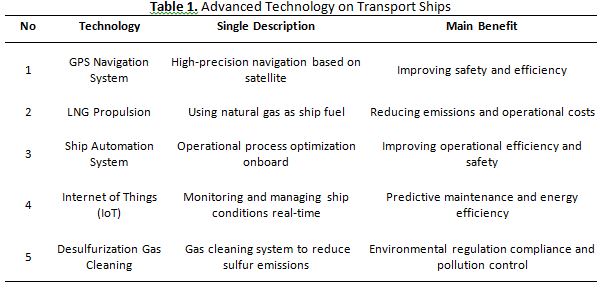Application of Advanced Technology on Transport Ships as a Technological Revolution in the Maritime Industry
Main Article Content
Abstract
Downloads
Article Details

This work is licensed under a Creative Commons Attribution 4.0 International License.
References
O. J. Rødseth and H. C. Burmeister, "Technology advances in maritime transportation," in Technology and Science for the Ships of the Future: Proceedings of the NAV 2015 18th International Conference on Ships and Shipping Research, M. Blanke, M. Henriques, and J. Bang, Eds. IOS Press, 2015, pp. 884-891.
L. Kretschmann, H. C. Burmeister, and C. Jahn, "Analyzing the economic benefit of unmanned autonomous ships: An exploratory cost-comparison between an autonomous and a conventional bulk carrier," Research in Transportation Business & Management, vol. 25, pp. 76-86, 2017.
G. Lachapelle, "GNSS for marine navigation," in Proceedings of the 2008 IEEE/ION Position, Location and Navigation Symposium, 2008, pp. 646-652.
S. Bengtsson, K. Andersson, and E. Fridell, "A comparative life cycle assessment of marine fuels: Liquefied natural gas and three other fossil fuels," Proceedings of the Institution of Mechanical Engineers, Part M: Journal of Engineering for the Maritime Environment, vol. 225, no. 2, pp. 97-110, 2011.
D. V. Widodo, A. Rosyadi, and D. R. Santoso, "Wireless sensor network for real-time measurement of ship's ballast water temperature," in 2017 International Conference on Advanced Mechatronics, Intelligent Manufacture, and Industrial Automation (ICAMIMIA), 2017, pp. 204-208.
E. Migueláñez-Martín, D. Ferrer-Comalat, and X. Martínez de Osés, "A machine learning method to automatically identify the main engine operating parameters based on high-frequency data from a ship," Journal of Marine Science and Engineering, vol. 8, no. 3, p. 200, 2020.
R. Wróbel, J. Montewka, and P. Kujala, "Towards the assessment of potential impact of unmanned vessels on maritime transportation safety," Reliability Engineering & System Safety, vol. 165, pp. 155-169, 2017.
M. A. Nze, A. A. Adediran, and M. B. Gumel, "A review on the technologies, opportunities and challenges of autonomous shipping," Journal of Physics: Conference Series, vol. 1378, no. 2, p. 022067, 2019.
S. D. Smith, "The Role of GPS in Maritime Navigation," Journal of Marine Science and Technology, vol. 23, no. 4, pp. 567-578, Dec. 2015.
J. R. Brown, "LNG as a Marine Fuel: Prospects and Challenges," Maritime Policy & Management, vol. 42, no. 6, pp. 524-539, Nov. 2016.
A. Kumar and R. C. Desai, "Automation in Maritime Industry: Current Trends," International Journal of Maritime Engineering, vol. 68, no. 3, pp. 225-234, Jul. 2017.
T. M. Chan, "IoT Applications in the Shipping Industry," IEEE Internet of Things Journal, vol. 5, no. 2, pp. 955-965, Apr. 2018.
P. Wang, "Emission Control Technologies for Marine Engines," Environmental Science & Technology, vol. 52, no. 1, pp. 102-111, Jan. 2019.
H. Wijaya and H. Setiawan, “Bridge Duty On A Ship: Study On Preventing Collisions At Sea On The Training Ship John Lie”, zonalaut, vol. 5, no. 1, pp. 28-36, Mar. 2024.

